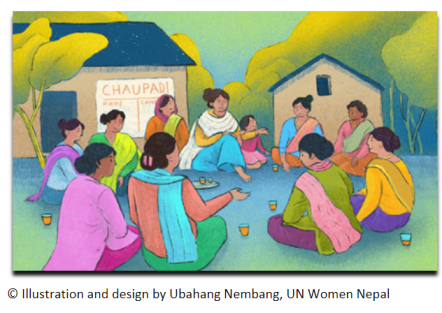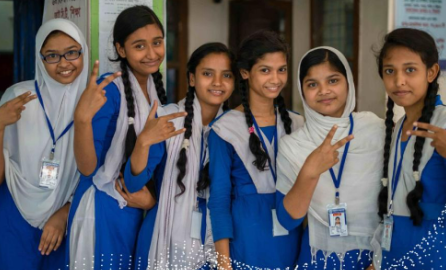The gender power of storytelling in Nepal

-
Gender marker: G2-Promotes gender equality as a primary objective
-
Period of implementation: 2020-2027
-
Amount: EUR 900,000 (now part of the general programme)
-
Geographical area: Asia and Pacific
-
(Co-) funded by: Finland
-
Implementing partner: UN Women Nepal Country Office
-
Team Europe Initiative: Empowering Women Prosperous Nepal
-
GAP III’s Areas:
-
Gender-Based Violence
-
Economic and social empowerment
-
Do you remember the stories they told you when you were a child? Having gender equality at the heart of its foreign policy, Finland believes in the strong power of stories to address the root causes of gender and other interlinked forms of discrimination and change harmful gendered social norms.
Together with the UN Women Nepal Country Office as an implementing partner, this initiative devotes time and resources to listen to women and girls’ stories and strengthen their voices, insights, and agency to fight for their rights in their communities (Provinces 2 (Madesh), 3 (Bagmati), 6 (Karnali) and 7 (Sudurpashchim).
These stories permit to explore hidden and deemed ‘undiscussable’ topics such as the so-called chauppadi, a social norm and practice in which women stay in a tent or hut during their menstrual cycle, away from other members of their household.
“In our village, women are not permitted to fetch water while menstruating. I considered not exposing my daughter to the same problem, but I am compelled to do so since it is a custom in the community. If I do not comply, people will not touch me or allow me and my family to fetch water from the common tap in our community. I have to stay in society, so I cannot abandon the practice. I wish to go to a place where there is no such chauppadi practice, but we do not have any land in other areas, so I have to stay in this village and continue practicing chauppadi. We can abolish this behaviour if everyone in society educates themselves and changes their thinking”. A woman from the Sudurpashchim Province.
By accompanying and listening to women and girls’ stories, this initiative contributes to establishing a baseline for tracking changes at the individual and community levels in this kind of social norms over time and measuring to what extent interventions effectively contribute towards transforming gendered social norms. Discrimination based on menstruation, caste, child marriage, witchcraft superstition, disability, domestic violence, and dowry have been the most common lived experiences revealed among the 1000 stories collected. But we cannot forget that the transition for women from sleeping in cow sheds during menstruation to sleeping in their own rooms is taking place only after years of sensitisation addressed not only to the menstruating women but towards the entire community and in particular the younger generation. This is also in line with the preliminary findings of the global Feminist Collaborative Evaluation (FCE)[1] conducted by the UN Women Independent Evaluation Service. The FCE has also pointed out some positive changes in some of these discriminatory social norms such as mobility restriction, women’s leadership, and caste-based discrimination with direct support from the Storytelling Initiative. The work on changing this norm is not finished, but it is underway.
Moreover, in addition to this research component, during the first two years, the initiative has also contributed to supporting women in the most marginalised situations by organising self-help and advocacy groups in the communities to support their immediate needs (i.e. seeds/vermicomposting, menstrual products, cooking gas, mobile phones or data cards) and provide sustainable livelihoods. These self-help and advocacy groups are also accompanied by “reflection sessions”, leadership training and group mobilisation like End Chaupadi! to build awareness and promote collective action on women’s rights and fighting gender-based violence. In addition, taking into account the key role of men and boys as agents for a more impactful transformative change, the project facilitates intergenerational dialogues around gender norms, masculinity and their role in promoting gender equality in the whole community. It also rolls out prevention initiatives with select educational institutions to transform narratives and attitudes that sustain and tolerate violence and discrimination in society.
Furthermore, in its third year and beyond, the project will employ creative storytelling to drive social change. UN Women plans to create communication materials and anonymous case studies to prompt community reflection for raising awareness and building capacity. The project will also assist women's groups and storytellers in transforming their stories into various creative forms, such as theatre, songs, and multimedia content. These initiatives aim to encourage people to question harmful social norms, fostering empathy and self-reflection to challenge gender inequality and social exclusion. Additionally, UN Women will adapt these stories into books, animations, or comic strips in local languages for diverse stakeholders, including children. Discussion sessions will accompany these materials to encourage deeper self-reflection.
But that’s not all! Besides, a virtual “learning hub” with a repository of information and knowledge products on gender norms and storytelling will host a discussion forum for development practitioners like you. So, do not lose the opportunity to learn more about the gender transformative power of storytelling and dive deeper into “HAMRO SAHAKARYA: OUR COLLECTIVE ACTION”
[1] This is a global formative evaluation being undertaken by the Independent Evaluation Service, which will facilitate an in-depth regional approach to provide comprehensive analysis and evidence-based experiences with social norms change programming at the field level. UN Women Nepal was selected as one of the case study countries from Asia and the Pacific region. A country case study is a critical component of the FCE, as they explore the pathways of change and inform implicit/explicit theories of change that can provide inspiration and lessons learned for social norms programming efforts at UN Women.
